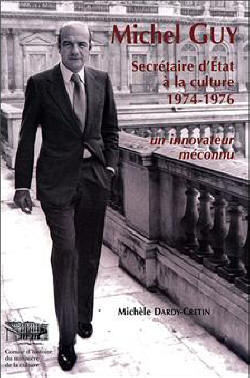 Michel Guy (28 June 1927 – 30 July 1990) was a French politician.
Michel Guy (28 June 1927 – 30 July 1990) was a French politician.
Queer Places:
156 Rue de Rivoli, 75001 Paris, France
 Michel Guy (28 June 1927 – 30 July 1990) was a French politician.
Michel Guy (28 June 1927 – 30 July 1990) was a French politician.
A horticulturist by training, he managed the family horticultural company Guy-Charon, between 1950 and 1970. Collector of modern and contemporary art (Bram van Velde), lover of dance and opera, he was artistic advisor of the Paris International Dance Festival from 1964 to 1971, with Jean Robin, director of the Théâtre des Champs-Élysées. Travelling around the world, he introduced promising dancers to the France: Paul Taylor, Merce Cunningham, Alwin Nikolais, Twyla Tharp. A close friend, Georges Pompidou, first thought of him to direct the Paris Opera, before finally appointing Rolf Liebermann. He then entrusted him with the responsibilityof the Festival d'automne à Paris, which he created in1972: symmetrically to the creation, with the Centre Georges-Pompidou, of a large institution devoted mainly to the visual arts and reading (music, with IRCAM, will only come in a second time), it is a question of creating in the capital a major event devoted to contemporary creation in the field of performing arts. This festival, which took over from the Festival des Nations, was a great success, which had a very great influence. It allowed Michel Guy to build close links with creators. On 8 June 1974, Michel Guy was appointed Secretary of State for Culture in the first Jacques Chirac government. Liberal in economic terms, he was a fervent supporter of political voluntarism in the cultural field, leaving a good image both on the left and on the right. It focused its action on live shows, centered on creation. He doubled the envelope of the theatrical policy allowing twenty-five troupes to receive one million francs each, installed a new generation at the helm of thedramatic centers (including Georges Lavaudant, Jean-Pierre Vincent, Bruno Bayen, Gildas Bourdet, Robert Gironès), against the spirit of popular theater according to some pioneers oftheatrical decentralization, and reformed the conservatory, at the head of which he appointed the avant-garde director Jacques Rosner, which caused a scandal. He supported Rolf Liebermann as general administrator of the Paris Opera, whose Don Giovanni he broadcast in 1976 on television as part of the obligation in the specifications of radio and television companies to broadcast a quota of artistic events. He founded with Philippe Tiry the Office national de diffusion artistique (ONDA) to help the reception of medium-sized theatrical and choreographic troupes by cultural facilities. He decided to create the Ensemble intercontempora in with Pierre Boulez, the Orchestre National de Lille with Jean-Claude Casadesus and the Metz orchestra. Promoter of American modern dance in France, since the International Dance Festival, he renovated the institutional approach to dance and entrusted Igor Eisner with the establishment of the General Inspectorate of Dance which defines a new dance policy. Under his impetus, the Ministry of Culture took over the responsibilities of the Ministry of National Education in the field of public reading, which in 1975 set up a Book Directorate and reformed theNational Centre for Letters. He launched "cultural charters" to accentuate collaboration between the State and local authorities, which later became "cultural development conventions". In the field of heritage policy, he was the architect of the classification of the historic centers of a hundred cities of more than 20,000 inhabitants, and many monuments of the nineteenth and twentieth centuries. He launched the Musée d'Orsay project, signed the decree creating the Centre Pompidou, doubling its operating budgets, installed the Picasso Museum at the Hôtel Salé and undertook the renovation of many provincial museums. He abolished censorship in cinemas, by introducing a 33% tax for violent or pornographic films, reformed the advance on receipts whose means he doubled, and enriched the Museum of Cinema. He left the ministry on August 27, 1976. "More aesthete than manager", he left a ministry revitalized by a "cultural bubbling" after a period of numbness, but without restoring significant weight within government policy, and leaving a promising project, but unfinished, therefore disappointing, according to Emmanuelle Loyer. Catherine Tasca, who succeeded him a quarter of a century later, praised a "stubborn, imaginative and innovative minister", having "bequeathed the spirit and set the course" of a redefined Ministry of Culture. He took over the direction of the Festival d'automne de Paris from February 1977 until his death. In 1980 he was appointed president of the Villa Médicis hors les murs of the Ministry of Foreign Affairs, a program of scholarships for artistic creation that he followed until his death, president of the board of directors of the Cinémathèque française also in 1980, deputy vice-president of the Festival d'Avignonin 1983, and vice-president of the European Society of Television Programs (La SEPT) in 1987. Michel Guy died of AIDS in 1990, without the press mentioning the cause of his death.
My published books: